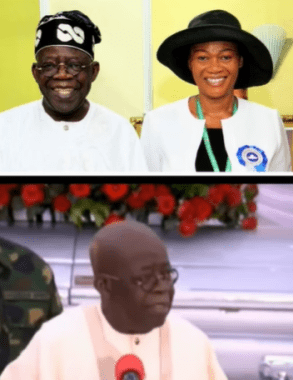President Bola Tinubu has urged Nigerians to embrace religious tolerance, using his own interfaith marriage as an example of peaceful coexistence between Muslims and Christians. Speaking at a funeral ceremony in Plateau State on Saturday, the President emphasized that faith should unite rather than divide the nation.
Tinubu shared a personal reflection on religious harmony within his home, noting that though he is a Muslim, his wife, Senator Oluremi Tinubu, is a Christian pastor, yet their differences in faith have never caused conflict. The President was in Jos to attend the funeral service of Lydia Yilwatda, mother of Professor Nentawe Yilwatda, the national chairman of the All Progressives Congress (APC).
“I inherited Islam from my family. I didn’t change. But my wife is a pastor. She prays for me. No conflict,” Tinubu told attendees at the service. “And I never did, at any single time, try to convince her or convert her. I believe in the freedom of religion.”
He urged citizens to promote tolerance, respect, and understanding across religious and ethnic lines, stating, “We are praying to the same God. We are answerable to the same Almighty God. We will answer to Him”. The President argued that personal deeds, character, and love for fellow human beings matter more than religious differences or methods of worship.
The President’s message comes at a critical time for Nigeria, where religious and ethnic tensions have contributed to ongoing security challenges. The nation faces complex conflicts that sometimes take on religious dimensions, though experts note these crises often involve multiple factors including land disputes, economic pressures, and criminal activities rather than purely religious motivations.
Nigeria’s population is roughly divided between Christians and Muslims, with the predominantly Christian southern regions contrasting with the largely Muslim northern areas. However, significant religious diversity exists within most states, creating opportunities for both cooperation and tension depending on local circumstances.
Tinubu emphasized that hatred should not be an option for Nigerians. “Love is what we should preach, that we should love one another,” he stated. “Nobody determines what God has ordained. God’s ordained actions and prophesies what matters.”
The President’s remarks reflect a longstanding reality in Nigerian society where interfaith marriages and business partnerships exist alongside religious tensions. Many Nigerian families, like the Tinubus, successfully navigate religious differences, though such arrangements can face social pressure in more conservative communities.
Tinubu also paid tribute to the late Lydia Yilwatda, describing her as a woman of faith, integrity, and service, whose life reflected the virtues of compassion and humility. The matriarch died in August at the age of 83. He offered prayers for the repose of her soul and urged her family, especially her son, to uphold her legacy of service.
The funeral brought together political and religious leaders from across Nigeria, demonstrating the type of interfaith cooperation the President advocates. However, the event also drew criticism from opposition figures, including former Vice President Atiku Abubakar, who questioned why Tinubu attended a political funeral in Plateau State while not visiting communities affected by ongoing violence in the region.
Religious freedom remains enshrined in Nigeria’s constitution, though its practical application varies across regions and communities. The country’s delicate religious balance requires constant attention from leaders, making presidential statements on tolerance particularly significant.
Tinubu’s personal example resonates with many Nigerians who navigate similar interfaith relationships daily. Senator Oluremi Tinubu, the First Lady, has been publicly known as a committed Christian throughout her political career, serving in various capacities while maintaining her pastoral role. Her husband’s Muslim faith has been equally public, with both attending their respective religious ceremonies and events.
The President concluded his remarks by emphasizing that religious differences should not prevent Nigerians from living harmoniously. “We are praying to the same God,” he reiterated, calling on citizens to focus on what unites rather than divides them.
As Nigeria continues grappling with security challenges and social tensions, the President’s message of religious tolerance adds to ongoing national conversations about unity, diversity, and peaceful coexistence. Whether these calls for tolerance translate into tangible improvements in interfaith relations remains to be seen, but Tinubu’s willingness to use his own marriage as an example provides a notable personal dimension to the broader policy discussions.
Source: newsghana.com.gh











